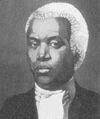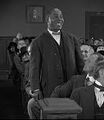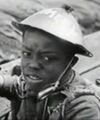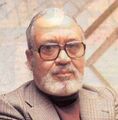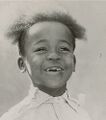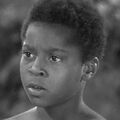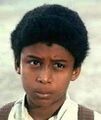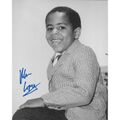Difference between revisions of "Category:African-American"
| Line 12: | Line 12: | ||
Crispus Attucks (1723–1770) | Crispus Attucks (1723–1770) | ||
Benjamin Banneker (1731–1806) | |||
Benjamin Banneker (1731–1806) -- | |||
Prince Hall (1735–1807) | Prince Hall (1735–1807) | ||
Phillis Wheatley ( | |||
Richard Allen (1760–1831) | * '''Phillis Wheatley''' (1753–1784), poet -- Born in West Africa and sold into slavery, she learned to read and write by the age of 9 and became the first African American woman to publish a book of poetry. In addition to having to prove she had indeed written the poetry, no one in America would publish her work. She was forced to go to England where the pieces were published in London in 1773. Years later, she sent one of her poems to George Washington who requested and received a meeting with her at his headquarters in Cambridge in 1776. | ||
James Forten (1766–1842) | |||
David Walker (1796–1830) | * '''Richard Allen''' (1760–1831), minister -- A minister, educator and writer, this Philadelphia native founded the African Methodist Episcopal Church, the first independent Black denomination in the United States. He opened the first AME church in Philly in 1794. Born into slavery, he bought his freedom in the 1780s and joined St. George's Church. Because of seating restrictions placed on Blacks to be confined to the gallery, he left to form his own church. In 1787 he turned an old Blacksmith shop into the first church for Blacks in the United States. | ||
Sojourner Truth ( | |||
John Russwurm (1799–1851) | * '''James Forten''' (1766–1842) -- Forten was an African-American abolitionist and wealthy businessman in Philadelphia. Born free in the city, he became a sailmaker after the American Revolutionary War. Following an apprenticeship, he became the foreman and bought the sail loft when his boss retired. Based on equipment he developed, he established a highly profitable business on the busy waterfront of the Delaware River, in what's now Penn's Landing. Having become well-established, in his 40s Forten devoted both time and money to working for the national abolition of slavery and gaining civil rights for Blacks. By the 1830s, his was one of the most powerful African-American voices in the city. | ||
David Walker (1796–1830) -- | |||
* '''Sojourner Truth''' (1797–1883) -- Truth was born into slavery but escaped with her infant daughter to freedom in 1826. She then sued and won the return of her 5-year-old son who was illegally sold into slavery. In 1851, Truth began a lecture tour that included a women's rights conference where she delivered her famous "Ain't I a Woman?" speech, challenging prevailing notions of racial and gender inferiority and inequality. She collected thousands of signatures petitioning to provide former slaves with land. | |||
John Russwurm (1799–1851) | |||
==== Born in the 19th century ==== | ==== Born in the 19th century ==== | ||
| Line 36: | Line 43: | ||
Henry McNeal Turner (1834–1915) | Henry McNeal Turner (1834–1915) | ||
* '''Octavius V. Catto''' (1839-1871), Civil Rights Activist -- Known as one of the most influential civil rights' activists in Philadelphia during the 19th century, Catto fought for the abolition of slavery and the implementation of civil rights for all. He was prominent in the actions that successfully desegregated Philadelphia's public trolleys and played a major role in the ratification of the 15th amendment, baring voter discrimination on the basis of race. Catto was only 32 when he was shot and killed outside of his home on South Street in1871, the first Election Day that African Americans were allowed to vote. In 2017, a monument to Catto was unveiled at Philadelphia's City Hall. | |||
Blanche K. Bruce (1841–1898) | Blanche K. Bruce (1841–1898) | ||
| Line 67: | Line 76: | ||
Claude McKay (1890–1948) | Claude McKay (1890–1948) | ||
Zora Neale Hurston (1891–1960) | |||
* '''Zora Neale Hurston''' (1891–1960), author -- Hurston became an American author, anthropologist, and filmmaker but as a child she was unable to attend school after her father stopped paying her school fees. In 1917 she opted to attend a public school but had to lie about her age in order to qualify for a free education. She studied hoodoo, the American version of voodoo, and found her way to Hollywood by working as a story consultant. One of her most notable works, Their Eyes Were Watching God was turned into a film in 2005. | |||
* '''Bessie Coleman''' (1892-1926), Civil Aviator -- Coleman was the first Black woman to fly an airplane. When American flying schools denied her entrance due to her race, she taught herself French and moved to France, earning her license from Caudron Brother's School in just seven months. She specialized in stunt flying and performing aerial tricks. Reading stories of World War I pilots sparked her interest in aviation. | |||
Walter F. White (1893–1955) | Walter F. White (1893–1955) | ||
Benjamin E. Mays (1894–1984) | Benjamin E. Mays (1894–1984) | ||
| Line 79: | Line 92: | ||
==== Born in the 20th century ==== | ==== Born in the 20th century ==== | ||
Louis Armstrong (1901-1971) -- | |||
Roy Wilkins (1901–1981) -- | Roy Wilkins (1901–1981) -- | ||
Langston Hughes (1901–1967) -- | Langston Hughes (1901–1967) -- | ||
| Line 106: | Line 120: | ||
Jackie Robinson (1919–1972) | Jackie Robinson (1919–1972) | ||
James Baldwin (1924–1987) -- | * '''James Baldwin''' (1924–1987) -- Baldwin was an American novelist, playwright and activist, most notably known for "Notes of a Native Son", "The Fire Next Time" and "The Devil Find's Work". One of his novels, If Beale Street Could Talk, was adapted into an Academy Award-winning dramatic film in 2018. "It is certain, in any case, that ignorance, allied with power, is the most ferocious enemy justice can have." | ||
Shirley Chisholm (1924–2005) -- | Shirley Chisholm (1924–2005) -- | ||
Malcolm X (1925–1965) -- | Malcolm X (1925–1965) -- | ||
John Coltrane (1926–1967) -- | John Coltrane (1926–1967) -- | ||
Maya Angelou (1928–2014) -- | Sidney Poitier (1927-2022) -- | ||
Martin Luther King Jr. (1929–1968) | |||
* '''Maya Angelou''' (1928–2014) -- Angelou was an American poet, singer, memoirist, and civil rights activist with a colorful and troubling past highlighted in her most famous autobiography, "I Know Why The Caged Bird Sings". She published seven autobiographies, three books of essays, several books of poetry, and is credited with a list of plays, movies and television shows spanning over 50 years. Her works have been considered a defense and celebration of Black culture. | |||
* Martin Luther King Jr. (1929–1968) | |||
Lorraine Hansberry (1930–1965) -- | Lorraine Hansberry (1930–1965) -- | ||
| Line 119: | Line 137: | ||
Bill Cosby (born 1937) -- | Bill Cosby (born 1937) -- | ||
Colin Powell (1937–2021) | Colin Powell (1937–2021) | ||
* '''Claudette Colvin''' (1939), Civil Rights Pioneer -- Colvin was arrested at the age of 15 for refusing to give up her seat to a white woman, nine months before Rosa Parks' more famous protest. Because of her age, the NAACP chose not to use her case to challenge segregation laws. Despite a number of personal challenges, Colvin became one of the four plaintiffs in the Browder v. Gayle case. The decision in the 1956 case ruled that Montgomery's segregated bus system was unconstitutional. | |||
Jesse Jackson (born 1941) -- | Jesse Jackson (born 1941) -- | ||
| Line 125: | Line 145: | ||
Muhammad Ali (1942–2016) -- | Muhammad Ali (1942–2016) -- | ||
Guion Bluford (born 1942) -- | Guion Bluford (born 1942) -- | ||
Oprah Winfrey ( | * Arthur Ashe (1943–1993) -- Ashe's resume includes three Grand Slam titles and the title of the first Black player selected to the United States Davis Cup team and the only Black man ever to win the singles title at Wimbledon, the US Open, and the Australian Open. In July 1979, Ashe suffered a heart attack while holding a tennis clinic in New York. His high profile drew attention to his condition, specifically to the hereditary aspect of heart disease. In 1992, Ashe was diagnosed with HIV; he and his doctors believed he contracted the virus from blood transfusions he received during his second heart surgery. After Ashe went public with his illness, he founded the Arthur Ashe Foundation for the Defeat of AIDS, working to raise awareness about the disease and advocated teaching safe sex education. On June 20, 1993, Ashe was posthumously awarded the Presidential Medal of Freedom by President Bill Clinton. | ||
Mae Jemison ( | |||
August Wilson (1945–2005) | |||
* '''Ruby Bridges''' (1954) -- At age 6, Bridges embarked on a historic walk to school as the first African American student to integrate the all-white William Frantz Elementary School in Louisiana. She ate lunch alone and sometimes played with her teacher at recess, but she never missed a day of school that year. In 1999, she established The Ruby Bridges Foundation to promote tolerance and create change through education. In 2000, she was made an honorary deputy marshal in a ceremony in Washington, DC. | |||
Oprah Winfrey (1954) -- | |||
Whoopi Goldberg (1955) | |||
Mae Jemison (1956) -- | |||
Michael Jackson (1958-2009) | Michael Jackson (1958-2009) | ||
Tiger Woods ( | Eddie Murphy (1961) -- | ||
Barack Obama (1961) -- | |||
Micheal Jordan (1963) | |||
Tiger Woods (1975) | |||
* '''Kobe Bryant''' (1978-2020) -- Drafted right out of Lower Merion High School at the age of 17, Bryant won five titles as one of the marquee players in the Los Angeles Lakers franchise. He was a member of the gold medal-winning U.S. men's basketball teams at the 2008 Beijing Olympic Games and the 2012 London Olympic Games. In 2015 Bryant wrote the poem "Dear Basketball," which served as the basis for a short film of the same name he narrated. The work won an Academy Award for best animated short film. A vocal advocate for the homeless Bryant and his wife, Vanessa started the Kobe and Vanessa Bryant Family Foundation aimed to reduce the number of homeless in Los Angeles. Bryant, his daughter Gigi, and seven other passengers died in a helicopter crash in late January. | |||
* '''Serena Williams''' (1981) -- Williams emerged straight outta the streets of Compton to become the world's No. 1 player. She has won 23 major singles titles, the most by any man or woman in the Open Era. The Women's Tennis Association ranked her world No. 1 in singles on eight separate occasions between 2002 and 2017. She has competed at three Olympics and won four gold medals. | |||
Revision as of 09:57, 22 November 2023
The category: African-American, highlights the ethnic and cultural identity of American people of African descent.
- See also: United States
Most Famous African-Americans
Born in the 18th century
Crispus Attucks (1723–1770)
Benjamin Banneker (1731–1806) -- Prince Hall (1735–1807)
- Phillis Wheatley (1753–1784), poet -- Born in West Africa and sold into slavery, she learned to read and write by the age of 9 and became the first African American woman to publish a book of poetry. In addition to having to prove she had indeed written the poetry, no one in America would publish her work. She was forced to go to England where the pieces were published in London in 1773. Years later, she sent one of her poems to George Washington who requested and received a meeting with her at his headquarters in Cambridge in 1776.
- Richard Allen (1760–1831), minister -- A minister, educator and writer, this Philadelphia native founded the African Methodist Episcopal Church, the first independent Black denomination in the United States. He opened the first AME church in Philly in 1794. Born into slavery, he bought his freedom in the 1780s and joined St. George's Church. Because of seating restrictions placed on Blacks to be confined to the gallery, he left to form his own church. In 1787 he turned an old Blacksmith shop into the first church for Blacks in the United States.
- James Forten (1766–1842) -- Forten was an African-American abolitionist and wealthy businessman in Philadelphia. Born free in the city, he became a sailmaker after the American Revolutionary War. Following an apprenticeship, he became the foreman and bought the sail loft when his boss retired. Based on equipment he developed, he established a highly profitable business on the busy waterfront of the Delaware River, in what's now Penn's Landing. Having become well-established, in his 40s Forten devoted both time and money to working for the national abolition of slavery and gaining civil rights for Blacks. By the 1830s, his was one of the most powerful African-American voices in the city.
David Walker (1796–1830) --
- Sojourner Truth (1797–1883) -- Truth was born into slavery but escaped with her infant daughter to freedom in 1826. She then sued and won the return of her 5-year-old son who was illegally sold into slavery. In 1851, Truth began a lecture tour that included a women's rights conference where she delivered her famous "Ain't I a Woman?" speech, challenging prevailing notions of racial and gender inferiority and inequality. She collected thousands of signatures petitioning to provide former slaves with land.
John Russwurm (1799–1851)
Born in the 19th century
Nat Turner (1800–1831) Ira Aldridge (1807–1867) Benjamin "Pop" Singleton (1809–1900)
Martin R. Delany (1812–1885) Henry Highland Garnet (1815–1882) Frederick Douglass (1817–1895) Alexander Crummell (1819–1898)
Harriet Tubman (1822–1913) Hiram Revels (1827–1901)
Henry McNeal Turner (1834–1915)
- Octavius V. Catto (1839-1871), Civil Rights Activist -- Known as one of the most influential civil rights' activists in Philadelphia during the 19th century, Catto fought for the abolition of slavery and the implementation of civil rights for all. He was prominent in the actions that successfully desegregated Philadelphia's public trolleys and played a major role in the ratification of the 15th amendment, baring voter discrimination on the basis of race. Catto was only 32 when he was shot and killed outside of his home on South Street in1871, the first Election Day that African Americans were allowed to vote. In 2017, a monument to Catto was unveiled at Philadelphia's City Hall.
Blanche K. Bruce (1841–1898) Edmonia Lewis (1844–1907) Elijah McCoy (1844–1929)
Booker T. Washington (1856–1915) Daniel Hale Williams (1856–1931)
Ida B. Wells-Barnett (1862–1931) George Washington Carver (1864–1943) Matthew Henson (1866–1955) Matthew Henson (1866–1955) Madame C. J. Walker (1867–1919) W. E. B. Du Bois (1868–1963)
James Weldon Johnson (1871–1938) Paul Laurence Dunbar (1872–1906) William Monroe Trotter (1872–1934) Arturo Schomburg (1874–1938) Mary McLeod Bethune (1875–1955) Carter G. Woodson (1875–1950) Garrett Morgan (1877–1963) Jack Johnson (1878–1946)
Ernest Just (1883–1941) Oscar Micheaux (1884–1951) Alain Locke (1885–1954) Marcus Garvey (1887–1940) A. Philip Randolph (1889–1979)
Claude McKay (1890–1948)
- Zora Neale Hurston (1891–1960), author -- Hurston became an American author, anthropologist, and filmmaker but as a child she was unable to attend school after her father stopped paying her school fees. In 1917 she opted to attend a public school but had to lie about her age in order to qualify for a free education. She studied hoodoo, the American version of voodoo, and found her way to Hollywood by working as a story consultant. One of her most notable works, Their Eyes Were Watching God was turned into a film in 2005.
- Bessie Coleman (1892-1926), Civil Aviator -- Coleman was the first Black woman to fly an airplane. When American flying schools denied her entrance due to her race, she taught herself French and moved to France, earning her license from Caudron Brother's School in just seven months. She specialized in stunt flying and performing aerial tricks. Reading stories of World War I pilots sparked her interest in aviation.
Walter F. White (1893–1955) Benjamin E. Mays (1894–1984) Charles Hamilton Houston (1895–1950) Marian Anderson (1897–1993) Elijah Muhammad (1897–1975) Paul Robeson (1898–1978) Duke Ellington (1899–1974) Percy Julian (1899–1975)
Born in the 20th century
Louis Armstrong (1901-1971) -- Roy Wilkins (1901–1981) -- Langston Hughes (1901–1967) -- Arna Bontemps (1902–1973) -- Ralph Bunche (1903–1971) -- Countee Cullen (1903–1946) -- Charles Drew (1904–1950) -- Thurgood Marshall (1908–1993) -- Adam Clayton Powell Jr. (1908–1972) -- Richard Wright (1908–1960) -- Katherine Dunham (1909–2006)
Romare Bearden (1911–1988) -- Benjamin O. Davis Jr. (1912–2002) -- Dorothy Height (1912–2010) -- Jesse Owens (1913–1980) -- Rosa Parks (1913–2005) -- Kenneth B. Clark (1914–2005) -- Joe Louis (1914–1981) -- John Henrik Clarke (1915–1998) -- John Hope Franklin (1915–2009) -- Gwendolyn Brooks (1917–2000) -- Fannie Lou Hamer (1917–1977) -- John H. Johnson (1918–2005) -- Dorie Miller (1919–1943) -- Edward W. Brooke (1919–2015) -- Jackie Robinson (1919–1972)
- James Baldwin (1924–1987) -- Baldwin was an American novelist, playwright and activist, most notably known for "Notes of a Native Son", "The Fire Next Time" and "The Devil Find's Work". One of his novels, If Beale Street Could Talk, was adapted into an Academy Award-winning dramatic film in 2018. "It is certain, in any case, that ignorance, allied with power, is the most ferocious enemy justice can have."
Shirley Chisholm (1924–2005) -- Malcolm X (1925–1965) -- John Coltrane (1926–1967) -- Sidney Poitier (1927-2022) --
- Maya Angelou (1928–2014) -- Angelou was an American poet, singer, memoirist, and civil rights activist with a colorful and troubling past highlighted in her most famous autobiography, "I Know Why The Caged Bird Sings". She published seven autobiographies, three books of essays, several books of poetry, and is credited with a list of plays, movies and television shows spanning over 50 years. Her works have been considered a defense and celebration of Black culture.
- Martin Luther King Jr. (1929–1968)
Lorraine Hansberry (1930–1965) -- Toni Morrison (1931–2019) -- Hank Aaron (1934–2021) -- Amiri Baraka (1934–2014) -- Bill Cosby (born 1937) -- Colin Powell (1937–2021)
- Claudette Colvin (1939), Civil Rights Pioneer -- Colvin was arrested at the age of 15 for refusing to give up her seat to a white woman, nine months before Rosa Parks' more famous protest. Because of her age, the NAACP chose not to use her case to challenge segregation laws. Despite a number of personal challenges, Colvin became one of the four plaintiffs in the Browder v. Gayle case. The decision in the 1956 case ruled that Montgomery's segregated bus system was unconstitutional.
Jesse Jackson (born 1941) -- Maulana Karenga (born 1941) -- Kwame Ture (1941–1998) -- Muhammad Ali (1942–2016) -- Guion Bluford (born 1942) --
- Arthur Ashe (1943–1993) -- Ashe's resume includes three Grand Slam titles and the title of the first Black player selected to the United States Davis Cup team and the only Black man ever to win the singles title at Wimbledon, the US Open, and the Australian Open. In July 1979, Ashe suffered a heart attack while holding a tennis clinic in New York. His high profile drew attention to his condition, specifically to the hereditary aspect of heart disease. In 1992, Ashe was diagnosed with HIV; he and his doctors believed he contracted the virus from blood transfusions he received during his second heart surgery. After Ashe went public with his illness, he founded the Arthur Ashe Foundation for the Defeat of AIDS, working to raise awareness about the disease and advocated teaching safe sex education. On June 20, 1993, Ashe was posthumously awarded the Presidential Medal of Freedom by President Bill Clinton.
August Wilson (1945–2005)
- Ruby Bridges (1954) -- At age 6, Bridges embarked on a historic walk to school as the first African American student to integrate the all-white William Frantz Elementary School in Louisiana. She ate lunch alone and sometimes played with her teacher at recess, but she never missed a day of school that year. In 1999, she established The Ruby Bridges Foundation to promote tolerance and create change through education. In 2000, she was made an honorary deputy marshal in a ceremony in Washington, DC.
Oprah Winfrey (1954) -- Whoopi Goldberg (1955) Mae Jemison (1956) -- Michael Jackson (1958-2009)
Eddie Murphy (1961) -- Barack Obama (1961) -- Micheal Jordan (1963)
Tiger Woods (1975)
- Kobe Bryant (1978-2020) -- Drafted right out of Lower Merion High School at the age of 17, Bryant won five titles as one of the marquee players in the Los Angeles Lakers franchise. He was a member of the gold medal-winning U.S. men's basketball teams at the 2008 Beijing Olympic Games and the 2012 London Olympic Games. In 2015 Bryant wrote the poem "Dear Basketball," which served as the basis for a short film of the same name he narrated. The work won an Academy Award for best animated short film. A vocal advocate for the homeless Bryant and his wife, Vanessa started the Kobe and Vanessa Bryant Family Foundation aimed to reduce the number of homeless in Los Angeles. Bryant, his daughter Gigi, and seven other passengers died in a helicopter crash in late January.
- Serena Williams (1981) -- Williams emerged straight outta the streets of Compton to become the world's No. 1 player. She has won 23 major singles titles, the most by any man or woman in the Open Era. The Women's Tennis Association ranked her world No. 1 in singles on eight separate occasions between 2002 and 2017. She has competed at three Olympics and won four gold medals.
Subcategories
This category has the following 38 subcategories, out of 38 total.
1
- 1859 * Tanner, Henry Ossawa (artist) USA
- 1866 Reed, George H. (actor) USA
- 1880 * Overton-Walker, Aida (dancer, choreographer) USA
- 1886 * Drew, Timothy (visionary) USA
- 1888 * Pippin, Horace (artist) USA
- 1891 * Hurston, Zora Neale (novelist) USA
- 1898 Robeson, Paul (actor, singer) USA
- 1903 * Cullen, Countee (poet) USA
- 1904 Jones, Ernestine (actress) USA
- 1906 Bellamy, Thomas (actor) USA
- 1912 Morrison, Ernst (actor) USA
- 1915 Morrison, Florence (actress) USA
- 1916 Jackson, Eugene (actor) USA
- 1916 * Yerby, Frank G. (novelist) USA
- 1919 Morrison, Dorothy (actress) USA
- 1921 Robinson, Sugar Ray (boxing).jpg
- 1925 Beard, Matthew (actor) USA
- 1925 Davis, Sammy (actor, singer) USA
- 1927 Hurlic, Philip (actor) USA
- 1927 Poitier, Sidney (actor) USA
- 1931 Jones, James Earl (actor) USA
- 1932 Hickman, Cordell (actor) USA
- 1935 Leedy, Glenn (actor) USA
- 1941 Hepburn, Philip (actor) USA
- 1942 Lymon, Frankie (singer) USA
- 1950 * Grimes, Nikki (novelist, poet) USA
- 1951 Johnson, Kyle (actor) USA
- 1952 Perry, Steven (actor) USA
- 1958 Hooks, Kevin (actor) USA
- 1958 Jackson, Michael (singer) USA
- 1958 Spell, George (actor) USA
- 1962 Copage, Marc (actor) USA
- 1965 Bridges, Todd (actor) USA
- 1967 * La Marre, Jean-Claude (actor, director) USA
- 1984 Chester, Vanessa Lee (actress) USA
- 1998 Smith, Jaden (actor) USA
Pages in category "African-American"
The following 3 pages are in this category, out of 3 total.
Media in category "African-American"
The following 44 files are in this category, out of 44 total.
- 1731 Banneker (naturalist).jpg 273 × 326; 7 KB
- 1735 Hall (freemason).jpg 474 × 600; 83 KB
- 1753 Wheatley (poet).jpg 806 × 1,024; 397 KB
- 1859 * Tanner, Henry Ossawa (artist) USA.jpg 287 × 401; 37 KB
- 1866 Reed, George H. (actor) USA.jpg 153 × 176; 17 KB
- 1880 * Overton-Walker (dancer).jpg 718 × 1,024; 296 KB
- 1888 * Pippin, Horace (artist) USA.jpg 266 × 374; 13 KB
- 1891 * Hurston, Zora Neale (novelist) USA.jpg 408 × 588; 50 KB
- 1898 Robeson, Paul (actor, singer) USA.jpg 440 × 548; 60 KB
- 1901 Armstrong, Louis (musician) USA.jpg 440 × 674; 96 KB
- 1904 Jones, Ernestine (actress) USA.jpg 254 × 198; 7 KB
- 1906 Bellamy, Thomas (actor) USA.jpg 1,000 × 1,253; 359 KB
- 1912 Morrison (actor).jpg 362 × 433; 24 KB
- 1913 Owens (athletics).jpg 268 × 400; 60 KB
- 1916 * Yerby, Frank G. (novelist) USA.jpg 200 × 204; 37 KB
- 1916 Jackson, Eugene (actor) USA.jpg 440 × 499; 46 KB
- 1921 Robinson (boxing).jpg 440 × 606; 50 KB
- 1925 Beard, Matthew (actor) USA.jpg 454 × 584; 100 KB
- 1925 Davis, Sammy (actor, singer) USA.jpg 191 × 264; 6 KB
- 1927 Hurlic, Philip (actor) USA.jpg 500 × 750; 21 KB
- 1927 Poitier, Sidney (actor) USA.jpg 440 × 537; 45 KB
- 1929 King, Martin Luther (politician) USA.jpg 440 × 660; 50 KB
- 1931 Jones, James Earl (actor) USA.jpg 500 × 750; 69 KB
- 1932 Hickman, Cordell (actor) USA.jpg 300 × 300; 11 KB
- 1935 Leedy, Glenn (actor) USA.jpg 500 × 750; 31 KB
- 1940 Rudolph (athletics).jpg 192 × 262; 9 KB
- 1942 Ali (boxing).jpg 440 × 551; 27 KB
- 1945 Anderson (singer).jpg 270 × 360; 21 KB
- 1955 Moses (athletics).jpg 960 × 1,287; 382 KB
- 1958 Spell, George (actor) USA.jpg 206 × 245; 5 KB
- 1959 Griffith-Joyner (athletics).jpg 674 × 900; 110 KB
- 1961 Carter, Ralph (actor) USA.jpg 155 × 207; 10 KB
- 1961 Lewis (athletics).jpg 298 × 372; 28 KB
- 1961 Obama (politician).jpg 480 × 600; 65 KB
- 1962 Copage, Marc (actor) USA.jpg 700 × 700; 65 KB
- 1962 Joyner-Kersee (athletics).jpg 440 × 681; 64 KB
- 1963 Jordan (basketball).jpg 360 × 441; 58 KB
- 1965 Bridges, Todd (actor) USA.jpg 198 × 255; 5 KB
- 1972 Leslie (basketball).jpg 853 × 1,200; 226 KB
- 1975 Woods (golf).jpg 340 × 511; 41 KB
- 1981 Williams, Serena (tennis).jpg 440 × 617; 64 KB
- 1984 Chester, Vanessa Lee (actress) USA.jpg 178 × 283; 5 KB
- 1997 Biles (gymnastics).jpg 440 × 660; 33 KB
- 2003 Wallis, Quvenzhane (actor) USA.jpg 193 × 261; 11 KB
